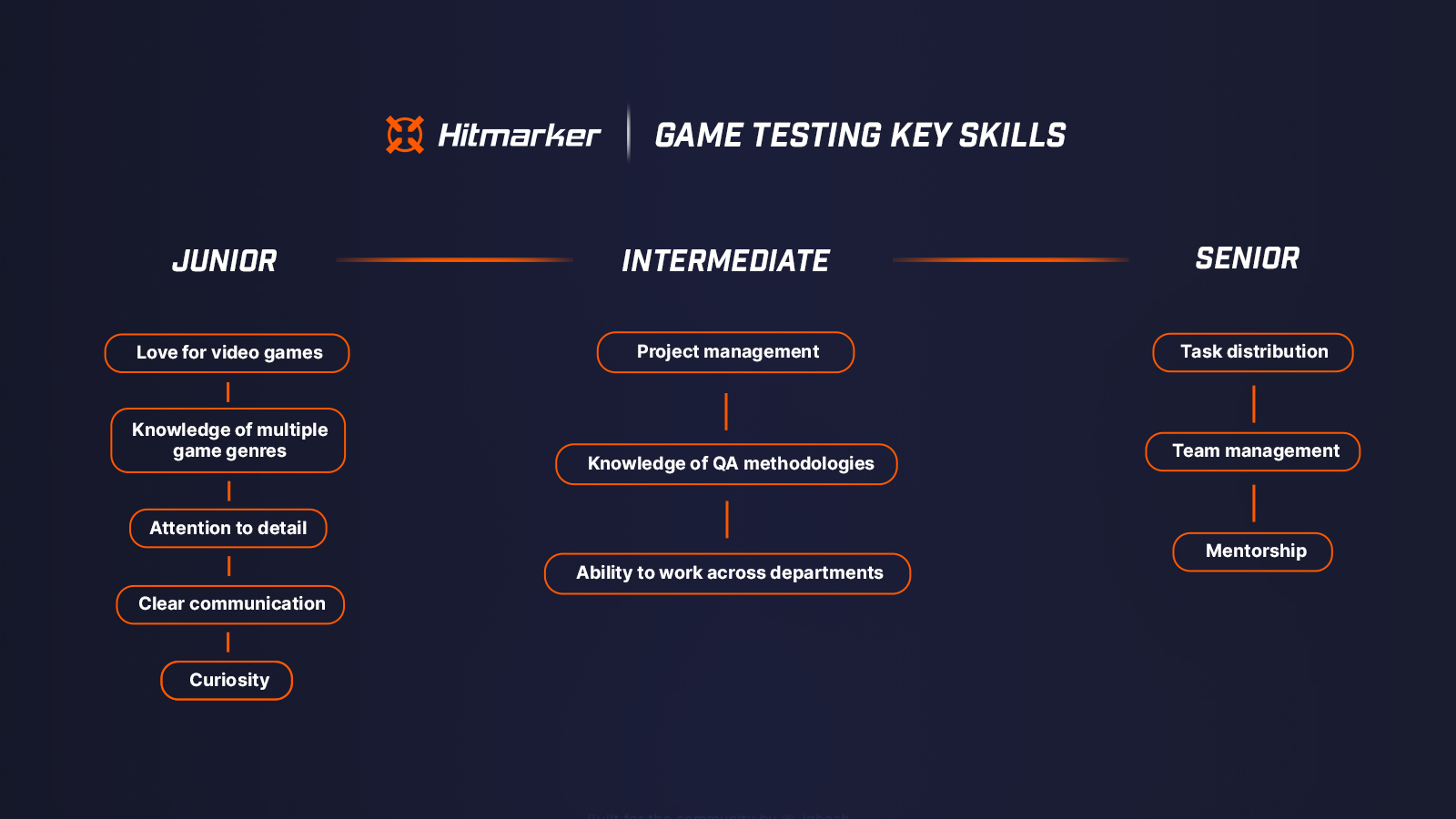What a video game tester does and how you can become one

Class Summary: What Does a Games Tester Do?
A video game quality assurance (QA) tester is an essential part of the game development process, with a focus on finding bugs and errors in code. They safeguard the end product against anything that could negatively affect a player’s experience of the game. But a games tester doesn’t just play the game and call it a day — they rigorously test each element of a mission, level, or encounter until every possible scenario has been covered.
Let’s put this into context: imagine a level has been designed with a very specific route in mind of where the player will go at each point of the story and how they will interact with the objects around them. What if a player then takes a route through the map that they weren’t meant to? Can they still reach the end goal? Is the experience still seamless, and does the code work properly throughout this alternative route? These are questions that a games QA tester might ask themselves on any given day.
We’re going to cover game quality assurance as a career in this article, starting with what the job requires and building towards what you can do to increase your chances of landing a position in the field. We’ve also spoken to some existing QA professionals in the industry to hear their advice for aspiring game testers and what they’ve learned along the way.
Let’s get into it!
Your Primary Quest:
The primary responsibility of a QA tester is to catch bugs before a game or patch is shipped to the world. You’ll be doing this through a bug database, logging issues as you find them and, crucially, providing a clear explanation of what the bug is and how to trigger it. This last point is especially important, as the more information you can pass onto the dev team, the sooner they can fix the issue. In more senior QA positions, you might also work with the development team to direct them to the priority bugs that need addressing.
Other tasks a QA tester may find themselves doing are creating test strategies and, in localization QA where the focus is on translating a game so that it can be enjoyed by another market and language, that linguistic and grammatical errors are spotted and resolved.
So now that we've talked about what a QA tester might get up to in their day-to-day tasks, let's look at what you'll need to excel in this role across junior, intermediate, and senior level positions.

“Time management is a huge skill to have in QA as you'll find yourself reporting a number of bugs, usually sorted by priority,” Chloe Jones, QA Analyst at Team17, told us. “Having a good attention to detail is also very beneficial as you can discover a lot more bugs that the general player may miss. As a lot of QA involves teamwork, it's also great to be a team player, as you can find yourself testing co-op games with your colleagues!”
Attila Kardos, QA Analyst at DPS Games, stressed the need to have the right approach to working in QA. “The most important thing is to have the right mindset. Being curious and a fast learner is the key in quality assurance, as is having great interpersonal skills,” he said. “The QA industry is a bit like the wild west; each company has their own interpretation of agile development and QA practices. Be flexible and help where you can to improve the industry. Focus on your progression and learn as much as you can!”
Player Profile
So you want to be a quality assurance tester in video games? It’s time to build your character profile then!
Don’t skip the tutorial
What’s needed to get started in quality assurance? Well, the good news is that it’s one of the most accessible professions in the entire video game industry. Entry and junior level game testing jobs will often be open to people with no professional testing experience. Instead, what companies are looking for is attention to detail, deep familiarity with gaming, and good communication skills.
“Getting early access to games on Steam, for example, can give you an idea of what it may be like as a QA tester, as there is the possibility to find a lot of obvious bugs — some early access games even include a bug reporting section!” Chloe points out. “What helped me the most was some general research on QA terms, such as what categories of bugs there are, how they are measured in severity, and what the layout of a bug report looks like.”
Another thing that can support your applications in the early stages of your career is if you can show familiarity with the game title(s) you’d be working on. If the job description states that you’d be working on World of Warcraft, for example, being able to tell the hiring manager about your numerous years spent playing the game and deep knowledge of its mechanics is very valuable. You’ll be able to spot bugs a whole lot quicker if you know how the game should run, after all.
Your written ability is another important part of a QA tester’s arsenal. Chloe told us how she, “underestimated how much writing is involved in QA, specifically writing reports/feedback and bugs! Bug reports need to be as brief and informative as possible whilst also being very clearly understood — it's quite a skill to develop!”
Buy the extra armour
While QA jobs tend to have quite a realistic set of requirements for candidates to meet, there are a few things you can do to increase your chance of finding a job in this field. Think of this as buying the boots and gauntlets to go with the rest of your gear, if you will.
“Having an IT/computing background or an ISTQB exam under your belt is a plus, especially if you are new to the industry,” Attila said when asked for his advice to aspiring game testers. “I would recommend mastering JIRA, Confluence, and TestRail as soon as possible; almost every major company uses these, but not everybody knows how to use them correctly.”
One of the most commonly-asked-for requirements in QA jobs is knowledge of a test case management software. Even being able to boast a cursory understanding of these in your applications can be a big help.
Clearing up myths
One question we were keen to ask Attila and Chloe was whether or not there were any QA myths they wanted to dispel. More than most sectors, there are some myths surrounding QA that don’t do the profession justice at all.
“My personal favourite QA myth is that human testers will become obsolete, but this can’t be farther from reality. The industry is booming and, despite the push towards automation, manual testing will always be there,” Attila told us.
Chloe wanted to highlight the significance of QA in the game development process. “The biggest myth is that QA isn't as important as other game industry jobs, but without the QA department reporting bugs, the game would be unplayable. A lot of non-industry folk assume that QAs are paid to play games, though QA is more focused on breaking it and reporting bugs, writing feedback; it's a lot more writing-involved than people think,” she told us.
“The last myth is that people only use QA to get into the industry then move to another department, and yes there are people who do that, but the majority choose QA as their long-term career choice,” Chloe finished.
Loadout Tips
To apply for jobs in QA, a professional resume and customized cover letter is likely all you’ll need. Be sure to check out our resume article if you need help there, as well as our cover letter guide to make sure you’re submitting your best profile each time you apply to a job.
In your cover letter, be sure to lean on the gaming experience you’ve built over the years. In QA more so than any other field, having expert knowledge of a wide variety of game titles is really going to help you. If you’re applying to a company whose game you’ve played avidly, bringing this up with examples that show your knowledge of the title is very important.
Your resume should look as it does when you apply to jobs outside of the game industry. Keep it professional, concise, and informative. Aim to keep it under one page, especially for junior level positions, and highlight any career or school experiences where you had to showcase communication, project management, or the ability to track issues.
Quest Rewards
What's the best thing about being a QA tester?
We've talked a lot about what a QA tester in the video game industry does and what skills are required, but what's it actually like working in the field? What are the highlights of the job that make it so rewarding?
For Attila, it’s how much the job can expose you to. “I love QA because it's fun and gives you a great way to learn about every aspect of software and game development.”
Chloe highlighted some of the bizarre encounters you can come across when testing a work-in-progress. “Discovering the most random and hilarious bugs is always a great time — I think nearly all QAs have had one super memorable bug that they found. I also love seeing the bugs I've reported get fixed! There’s nothing more satisfying than seeing your work change a game for the better,” she told us.
The impact she can have on a game is another thing that Chloe cherishes. “QA can be responsible for real game-changing improvements, and it feels so fulfilling to be a part of something great!”
QA Tester Salary
If you decide that game testing is the right job for you, and you have taken the right steps to prepare yourself for this career path, what can you expect to earn?
Entry level positions can start at around $25-35k per year, heading to upwards of $70k annually for more senior positions. The industry average in the US is around $58k, according to Glassdoor.
If this sounds like your ideal career, then why hesitate? Take a look at all the video game testing jobs currently open on Hitmarker here.
Good luck with your search — we're here to help however we can.